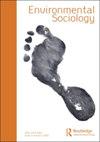From inclusion to epistemic belonging in international environmental expertise: learning from the institutionalisation of scenarios and models in IPBES
IF 2.8
Q3 ENVIRONMENTAL STUDIES
引用次数: 7
Abstract
ABSTRACT The inclusion of diverse perspectives from different disciplines, genders and locations has become a foreground concern in environmental expertise. While inclusion is increasingly accounted for in the design and evaluation of expert organisations, questions remain about the extent to which the pursuit of inclusion equates to effective participation. Building on recent scholarship on expertise in environmental sociology and public participation in environmental governance, this paper puts forward the argument that enabling inclusion in international expert organisations can be supported by facilitating epistemic belonging – a state achieved not only through mutual recognition of skilful practice amongst their expert communities (i.e. group belonging) but also the mobilisation of material resources within and beyond these organisations that enable participating experts to assert their importance, define their specialist skills and to effectively enact their epistemic practices. In this account, I trace the institutionalization of biodiversity scenarios and models in the Intergovernmental Science-Policy Platform on Biodiversity and Ecosystem Services (IPBES) to show how achieving epistemic belonging requires expert communities to actively reshape the resource environments in which they operate. This account extends current sociological perspectives on environmental expertise and offers insights for environmental expert organisations seeking to broaden their inclusion practices.从国际环境专业知识的包容到认知归属:从IPBES情景和模型的制度化中学习
包含来自不同学科、性别和地点的不同观点已经成为环境专业知识的前景关注。虽然在专家组织的设计和评估中越来越多地考虑到包容性,但对包容性的追求在多大程度上等同于有效参与的问题仍然存在。以最近在环境社会学和公众参与环境治理方面的专业知识为基础,这篇论文提出了这样的观点,即加入国际专家组织可以通过促进知识归属来支持——一种不仅通过专家社区之间相互承认熟练的实践(即群体归属),而且通过动员这些组织内外的物质资源来实现的状态,使参与的专家能够断言他们的重要性。定义他们的专业技能,并有效地实施他们的认知实践。在这篇文章中,我追溯了生物多样性和生态系统服务政府间科学政策平台(IPBES)中生物多样性情景和模型的制度化,以展示如何实现认知归属需要专家社区积极重塑其运作的资源环境。这个帐户扩展了当前社会学对环境专业知识的看法,并为寻求扩大其包容性实践的环境专家组织提供了见解。
本文章由计算机程序翻译,如有差异,请以英文原文为准。
求助全文
约1分钟内获得全文
求助全文
来源期刊

Environmental Sociology
ENVIRONMENTAL STUDIES-
CiteScore
4.60
自引率
12.00%
发文量
34
期刊介绍:
Environmental Sociology is dedicated to applying and advancing the sociological imagination in relation to a wide variety of environmental challenges, controversies and issues, at every level from the global to local, from ‘world culture’ to diverse local perspectives. As an international, peer-reviewed scholarly journal, Environmental Sociology aims to stretch the conceptual and theoretical boundaries of both environmental and mainstream sociology, to highlight the relevance of sociological research for environmental policy and management, to disseminate the results of sociological research, and to engage in productive dialogue and debate with other disciplines in the social, natural and ecological sciences. Contributions may utilize a variety of theoretical orientations including, but not restricted to: critical theory, cultural sociology, ecofeminism, ecological modernization, environmental justice, organizational sociology, political ecology, political economy, post-colonial studies, risk theory, social psychology, science and technology studies, globalization, world-systems analysis, and so on. Cross- and transdisciplinary contributions are welcome where they demonstrate a novel attempt to understand social-ecological relationships in a manner that engages with the core concerns of sociology in social relationships, institutions, practices and processes. All methodological approaches in the environmental social sciences – qualitative, quantitative, integrative, spatial, policy analysis, etc. – are welcomed. Environmental Sociology welcomes high-quality submissions from scholars around the world.
 求助内容:
求助内容: 应助结果提醒方式:
应助结果提醒方式:


